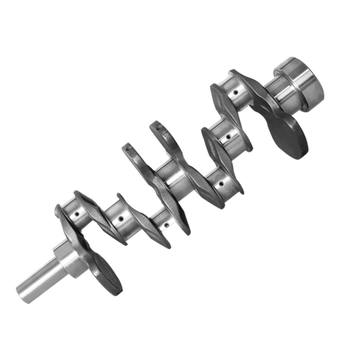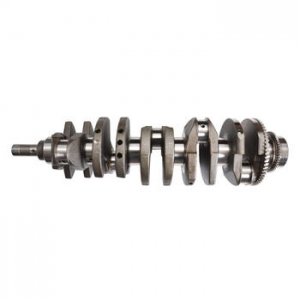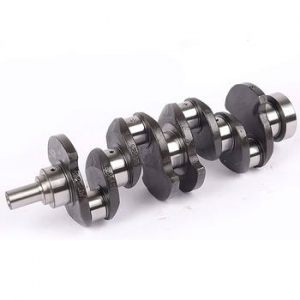The crankshaft is, without a doubt, one of the most critical components in any internal combustion engine, and the Hyundai D4EA and D4EB diesel engines are no exception. Its primary function is to convert the reciprocating motion of the pistons into rotational motion, which ultimately drives the wheels of your vehicle. When dealing with sophisticated engines like the D4EA and D4EB, especially when considering replacements, it's crucial to understand the significance of using OEM (Original Equipment Manufacturer) parts like the 23110-27000 or 23110-27420 crankshaft. But why is the crankshaft so important, and why is choosing the correct OEM part number so vital for your Hyundai's engine health and performance? Let's dive into the specifics.
Understanding the Role of the Crankshaft in D4EA/D4EB Engines
The Hyundai D4EA and D4EB are robust diesel engines found in various Hyundai and Kia models. Within these engines, the crankshaft plays a central role in the combustion process. It receives the force generated by the pistons during each combustion cycle and transforms it into the rotational power needed to turn the transmission and ultimately move the vehicle. The crankshaft doesn't work alone; it interacts with connecting rods, pistons, bearings, and the engine block to ensure smooth and efficient operation. Any imperfection or weakness in the crankshaft can lead to severe engine damage, including reduced power, increased fuel consumption, and even complete engine failure. So, a durable and precisely engineered crankshaft is essential for maintaining your engine's optimal performance and longevity. You could say the crankshaft is the spine of your engine.
Why Choose OEM Crankshafts: 23110-27000 and 23110-27420
When it comes to replacing a crankshaft, opting for an OEM part like the 23110-27000 or 23110-27420 offers significant advantages. OEM crankshafts are manufactured to the exact specifications and tolerances set by Hyundai. This means they are designed to perfectly fit and function within the D4EA or D4EB engine, ensuring optimal performance and reliability. Aftermarket crankshafts, while potentially cheaper, may not meet the same stringent quality standards. This can lead to premature wear, reduced engine efficiency, and even potential damage to other engine components. Using an OEM crankshaft guarantees compatibility and helps maintain the original performance characteristics of your Hyundai engine. We've seen countless cases where using non-OEM parts led to further, more costly repairs down the line.
The Criticality of Material and Manufacturing Process
The crankshaft's durability and performance are heavily influenced by the materials used and the manufacturing processes employed. OEM crankshafts are typically made from high-strength forged steel, which undergoes a series of precision machining and heat-treating processes. This ensures the crankshaft can withstand the extreme stresses and temperatures generated within the engine. The 23110-27000 and 23110-27420 crankshafts are specifically designed to endure the high compression ratios and demanding operating conditions of the D4EA and D4EB diesel engines. Lower-quality aftermarket options may use inferior materials or less precise manufacturing techniques, making them more susceptible to cracking, bending, or premature wear. Choosing OEM provides assurance that you are getting a crankshaft built to last.
Identifying a Failing Crankshaft: Signs and Symptoms
Recognizing the signs of a failing crankshaft is crucial for preventing further engine damage. Some common symptoms include unusual engine noises (knocking or rattling), excessive vibration, reduced engine power, and difficulty starting the engine. In some cases, you may also notice metal shavings in the engine oil, indicating internal wear and damage. A failing crankshaft can also trigger the engine's check engine light, displaying error codes related to crankshaft position or timing. If you experience any of these symptoms, it's essential to have your vehicle inspected by a qualified mechanic as soon as possible. Delaying repairs can lead to catastrophic engine failure, resulting in significantly higher repair costs. Have you ever noticed these symptoms and wondered what the underlying issue was? It often comes down to the crankshaft.
Installation Considerations for the 23110-27000 / 23110-27420 Crankshaft
Installing a new crankshaft is a complex and precision-oriented task that should ideally be performed by a qualified mechanic with experience working on Hyundai D4EA and D4EB engines. The installation process involves disassembling the engine, removing the old crankshaft, thoroughly cleaning the engine block and related components, and then carefully installing the new crankshaft with the correct bearings and clearances. Proper lubrication is crucial during installation to prevent premature wear and ensure smooth operation. Additionally, the mechanic will need to torque the crankshaft bolts to the manufacturer's specifications to ensure proper clamping force and prevent loosening over time. In short, this isn't a DIY job unless you possess advanced mechanical skills and the necessary tools.
Maintenance Tips to Extend Crankshaft Lifespan
While the crankshaft is a robust component, proper maintenance can significantly extend its lifespan. Regular oil changes with high-quality engine oil are essential for reducing friction and wear on the crankshaft bearings. Following the manufacturer's recommended oil change intervals is crucial. Additionally, maintaining a clean air filter helps prevent abrasive particles from entering the engine and causing damage. Avoiding excessive engine revving and sudden acceleration can also reduce stress on the crankshaft. Finally, addressing any engine issues promptly, such as misfires or knocking, can prevent further damage to the crankshaft and other engine components. Think of it as preventative medicine for your engine.
Real-World Applications and Case Studies
We've seen numerous instances where using the correct OEM crankshaft, specifically the 23110-27000 or 23110-27420, has made a significant difference in engine performance and longevity. In one particular case, a Hyundai Tucson with a D4EA engine experienced severe engine knocking and reduced power. After diagnosing the problem, it was determined that the crankshaft had worn bearings and was causing excessive vibration. Replacing the crankshaft with the OEM part number 23110-27000 restored the engine's performance and eliminated the knocking noise. The customer reported a noticeable improvement in fuel economy and overall driving experience. This is just one example of how using OEM parts can ensure optimal engine performance and reliability. These stories happen every day, highlighting the importance of quality parts.
The Long-Term Value of Investing in OEM Crankshafts
While OEM crankshafts may have a higher initial cost compared to aftermarket options, they offer significant long-term value. The superior quality, precise engineering, and guaranteed compatibility of OEM parts contribute to increased engine reliability, reduced maintenance costs, and extended engine lifespan. By choosing the 23110-27000 or 23110-27420 crankshaft, you are investing in the long-term health and performance of your Hyundai D4EA or D4EB engine. This can save you money in the long run by preventing costly repairs and reducing the risk of engine failure. Furthermore, maintaining your vehicle with OEM parts can also help preserve its resale value. Truthfully, it's about making a smart investment for the future.
Where to Find Genuine Hyundai Crankshafts
Ensuring you purchase a genuine OEM crankshaft is crucial. We recommend sourcing your 23110-27000 or 23110-27420 crankshaft from reputable suppliers. We, at our company, are a trusted distributor of genuine Hyundai parts, including crankshafts. Buying from authorized dealers or established auto parts retailers reduces the risk of purchasing counterfeit or substandard parts. Be wary of suspiciously low prices, as they may indicate a fake or low-quality product. Always verify the part number and manufacturer markings to ensure authenticity. Don't hesitate to ask for proof of authenticity or warranty information before making a purchase. After all, it's your engine's health on the line.
Conclusion: The Indispensable Crankshaft and OEM Advantage
In conclusion, the crankshaft is a vital component in the Hyundai D4EA and D4EB diesel engines, responsible for converting linear motion into rotational power. Choosing an OEM crankshaft, specifically the 23110-27000 or 23110-27420, is paramount for ensuring optimal engine performance, reliability, and longevity. While aftermarket options may seem appealing due to their lower price, they often lack the quality, precision, and durability of OEM parts. Investing in a genuine Hyundai crankshaft guarantees compatibility, reduces the risk of engine damage, and ultimately saves you money in the long run. So, when it comes to replacing your crankshaft, always opt for the OEM advantage. Your engine will thank you for it.




